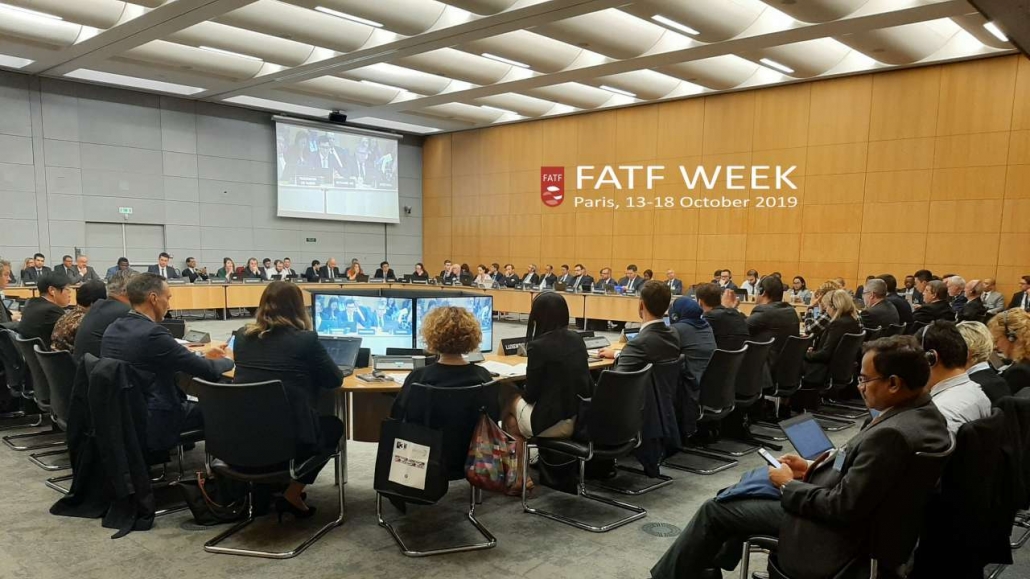Table of Contents
- Overview
2. Second 12-month Review of Revised Guidance on Virtual Assets and VASPs
- Highlights
- P2P transactions
- Delay in Travel Rule implementation
- Progress in technological innovation to combat ML/TF
- New FATF crypto guidance finalized in November 2021
3. Other FATF Plenary Outcomes - Combating ML through environmental crime
- Combatting financing of ethically or racially motivated terrorism
- Improving AML/CFT efforts through technological innovation
- Strategies to improve asset recovery outcomes
- Evaluation of South Africa and Japan’s AML/CTF measures
Overview
The fourth Plenary of the Financial Action Task Force (FATF) under the German Presidency of Dr. Marcus Pleyer took place virtually from June 20 to 25th 2021.
Following its flagship annual conference, the global AML/CFT regulatory watchdog published its June Plenary Outcomes, which includes information on new crypto guidance, as well as its Second 12-Month Review of the Revised FATF Standards on Virtual Assets and VASPs, which follows up on the FATF’s 2019 guidance update and June 2020’s first review to help regulate virtual asset service providers and their transactions.
In a temporary reprieve to the embattled virtual assets industry, the FATF postponed the official update of its crypto guidance to November 2021 in order to digest more feedback (and criticism) that followed from its proposed new guidance issued in February.
It also found that while peer-to-peer transactions (such as those found in the DeFi sector) were “substantial” based on market metrics from leading blockchain analytics companies, the size and ML/TF threat of this market could not be determined, and did not indicate a clear shift towards it by crypto users.
Overall, while there was noticeable progress in implementing guidance like the Travel Rule, there were still concerning implementation gaps that needed to be removed.
The FATF has urged all jurisdictions going forward to implement the new Standards and the Travel Rule as swiftly as possible. While it will also speed up the Travel Rule’s implementation and monitor the crypto industry, it won’t make further crypto-related adjustments to the Standards at this stage.
Also of particular interest to the crypto industry, was the FATF’s largely favorable mutual evaluations of Japan and South Africa’s AML compliance. However, FATF pointed out South Africa’s significant shortcomings that remain and that the country should seek international cooperation and utilize its financial intelligence tools better. South Africa brought out a new proposed position paper on crypto assets that promised “phased and structured” regulations recently in response.
Interestingly, “blockchain island” Malta, which previously courted global crypto exchanges like under-fire Binance, has been added to FATF’s list of increased supervision (informally known as its gray list).
Second 12-month Review of Revised Guidance on Virtual Assets and VASPs

On July 5th, 2021, FATF published a report on its strategic initiative the Second 12-Month Review of the Revised FATF Standards on Virtual Assets/VASPs, the follow-up to June 2020’s first review.
The 2021 report was commissioned in order to track how well countries and the private sector are implementing the updated Standards, as well as any changes in the virtual assets sector’s typologies, risks, and market structure.
This followed a disappointingly slow uptake by countries during the 2019’s guidance’s first year, as a result of issues like lack of existing technology and the “sunrise problem”, where different jurisdictions were not all on the same page in terms of local regulations and licensing requirements.
During the latest 12-month review, the progress in implementing the FATF’s revised Standards on virtual assets and virtual asset service providers (VASPs) was further discussed.
Second 12-Month Review Highlights
During the review, the FATF found that many countries and jurisdictions have made progress in implementing the new Standards, but not enough.
- So far, 58 of the 128 reporting jurisdictions have confirmed that they have implemented the revised FATF Standards
- 52 of these have implemented laws to regulate VASPs, while the remaining six have prohibited VASPs from operating completely.
- The remaining 70 reporting jurisdictions have not implemented the new Standards, including the FATF Travel Rule, in their national laws.
- This failure to comply with the Standards “disincentivizes” the necessary Travel Rule compliance solutions and infrastructure to be established
- It also creates implementation gaps and a lack of a local regime, meaning VASPs can be misused through jurisdictional arbitrage to facilitate money laundering and criminal activities via virtual assets.
P2P transactions
Additionally, the report discusses market metrics for peer-to-peer transactions (i.e. virtual asset transfers that take place without the use of a VASP), based on input from seven blockchain analytics firms. According to the report, market metrics indicate that a sizable amount of virtual assets is transferred peer-to-peer. Illicit transactions also appear to be more prevalent in peer-to-peer transactions, both in terms of volume and U.S. dollar value, when compared to transactions with VASPs, at least in terms of direct transactions.
However, there were significant discrepancies between the data provided by blockchain analytic firms. As a result, the peer-to-peer sector’s size and associated risk of money laundering and terrorist financing remain unknown. As a result, the report finds no clear evidence of a move toward peer-to-peer transactions.
In response, a coalition of leading blockchain organizations has written an open letter to FATF with several DeFi proposals.
Delay in Travel Rule implementation
The Travel Rule requires that VASPs share originator and beneficiary user information on domestic and cross-border transactions exceeding $1,000 amongst each other.
The delay in implementing the solution is partly due to its complexity. However, the FATF has indicated that a “lack of regulation or implementation of regulation in jurisdictions can enable continued misuse of virtual assets through jurisdictional arbitrage”. Therefore, the FATF has urged all jurisdictions to implement the revised Standards as quickly as possible.
Progress in technological innovation to combat ML/TF
Despite the delay in the Standards’ implementation by 70 of the jurisdictions, there has been progress in the development of innovations and solutions that enable the implementation of the Travel Rule for VASPs. But, the delay in implementation by most jurisdictions has caused a ripple effect in the private sector, particularly VASPs to invest in the necessary technology to comply with the Travel Rule.
The report also finds that a significant number of virtual asset transactions are done on a peer-to-peer basis ( without the use of a VASP). The report also finds that the number of illicit transactions is higher in direct peer-to-peer transactions, in terms of number and USD volume than those done through a VASP. This is based on data from seven blockchain analytics companies. However, due to the discrepancies in data between the companies, the size of the peer-to-peer sector and its associated ML/TF risk, as well as a trend towards peer-to-peer transactions, remains unclear.
New FATF crypto guidance finalized in November 2021
In order to guarantee that all jurisdictions comply with the new FATF Standards, including the Travel Rule, as quickly as possible, the FATF has committed to finalizing the revised FATF Guidance on virtual assets and VASPs by November 2021, as well as continuing to monitor the virtual asset and VASP sector.
Other FATF Plenary Outcomes

During the Plenary, a number of pertinent topics were discussed and finalized, including:
- A report of the financial flows linked to environmental crime
- A report on the financing of ethically or racially motivated terrorism
- Two reports forming part of FATF’s project to improve anti-money laundering and counter-terrorist financing (AML/CFT) efforts through technological innovation
- A report for government authorities that identifies strategies to improve asset recovery outcomes
It was also agreed that the FATF would release a white paper on the transparency and public ownership of legal persons in order to improve preventative tactics on criminals hiding illicit activity and proceeds. The white paper is due to be published on 27 August 2021.
Combating money laundering through environmental crime
Environmental crime, which includes illegal mining, logging, land clearing, and waste trafficking, is a significant criminal enterprise that generates billions in illicit revenue every year. So far, there has been little government intervention in laundering the proceeds of these crimes, which criminals are able to exploit, all while contributing to the destruction of the natural environment.
One of the reports finalized at the latest Plenary seeks to rectify this by raising awareness about environmental crimes laundering techniques, as well as the scale of the crimes. The report also highlights the frequent use of trade-based fraud as well as shell and front companies by criminals to launder money from environmental crime. Criminals also often intermingle legal and illegal goods early on in the supply change to avoid detection.
The report stressed the need for AML authorities to collaborate with environmental crime investigators and environmental agencies as well as other key stakeholders.
Combatting financing of ethically or racially motivated terrorism
Ethically or racially motivated terrorism also referred to as extreme right-wing terrorism (ERW) has increased in recent years, which has highlighted the need to raise awareness on it, as well as its financing.
A report published by FATF highlights the challenges in tackling criminal funding of this nature as a lot of it comes from donations, membership fees, and commercial activities. The report urges countries to continue to develop their understanding of this type of criminal activity, including by considering ethically or racially motivated terrorism financing (EoRMTF) in their risk assessments.
Improving AML/CFT efforts through technological innovation
During the Plenary, the FATF finalized a report that identifies emerging and available technology-based solutions to help improve AML/CFT efforts. The report also highlights the necessary conditions, policies, and practices that need to be in place to successfully utilize these technologies as well as the obstacles that could prevent successful implementation.
Strategies to improve asset recovery outcomes
The FATF also discussed the need to improve asset recovery measures. By confiscating illegal assets to compensate victims of financial crime, authorities remove illicit funds from the financial system and the incentive that drives criminal activity. Although asset recovery is a main component of the FATF Recommendations, only a small fraction of the assessed countries were able to satisfactorily implement asset recovery outcomes. The report also outlined the obstacles to asset recovery for government authorities and how to overcome them. The topic will be discussed further at the October meeting.
Evaluation of South Africa and Japan’s AML/CTF measures
The FATF also conducted a mutual evaluation of Japan and South Africa’s current AML/CFT measures. In an assessment run by the IMF, it was found that South Africa has a solid legal framework in combating money laundering and terrorist financing but that significant shortcomings remain. The FATF advised that the country needs to adjust its AML/CFT measures in accordance with its risk profile by “proactively seeking international cooperation, detecting and seizing illicit cash flows, and improving the availability of beneficial ownership information”.
In the assessment, South Africa was also urged to ensure that authorities make better use of the financial intelligence products provided by the country’s financial intelligence unit, as well as improve the application of the risk-based approach by obligated entities and supervisors.
Japan’s measures to combat ML/TF were also discussed and it was found that the country’s measures in this regard were delivering results. However, areas that should be prioritized include “the supervision of and preventive measures by financial institutions and designated non-financial businesses and professions, the prevention of misuse of legal persons and arrangements, and investigating and prosecuting money laundering and terrorist financing”.
Subsequent to a quality and consistency review, these reports will be published by FATF in August.


